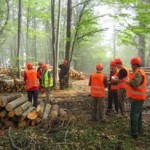 Doha, Qatar – Grassroots projects can guide the policies needed to build climate resilience, reverse the loss of natural resources and contribute to an inclusive Green Economy, according to a new United Nations Environment Programme (UNEP) booklet launched on December 1 at the UN Climate Change Conference in Doha, Qatar.
Doha, Qatar – Grassroots projects can guide the policies needed to build climate resilience, reverse the loss of natural resources and contribute to an inclusive Green Economy, according to a new United Nations Environment Programme (UNEP) booklet launched on December 1 at the UN Climate Change Conference in Doha, Qatar.
While vulnerability to climate change poses risks to all communities, the impacts are likely to be tilted against many of the world’s poorest regions, which have the least economic, institutional and technical ability to adapt and cope.
“Seeds of Knowledge” aims to show that grassroots, community-led responses are already playing an essential role in building resilience to climate change across all regions of the world. With the right levels of investment and support, such initiatives can be scaled up and become a central component in reducing climate risks and supporting the transition to an inclusive green economy.
It features case studies from Afghanistan, Bosnia & Herzegovina, Columbia, China, Ecuador, Egypt, Ethiopia, Guatemala, Jordan, Mauritania, Mozambique, Nicaragua, Panama, Peru, Philippines, Senegal and Turkey.
As the convener for environment and climate change under the Millennium Development Goals Achievement Fund (MDG-F) initiative, UNEP has supported partners with climate change programmes in 17 countries. These focus on adaptation measures for coping with climate change, including community preparedness to tackle the impacts.
The MDG-F was established in 2006 by the Spanish Government to accelerate efforts at the country level to achieve the Millennium Development Goals and to improve cooperation and cohesion across the UN system. Spain contributed US $ 89 million to support the MDG-F work on environment and climate change, which will end in December 2012.
“Attaining environmental sustainability is a major challenge of the Millennium Development Goals and is also crucial to ensure sustainable development at a larger scale,” said Federico Ramos de Armas, Spain’s State Secretary for the Environment.
“In order to accomplish and accelerate progress on the MDGs at the country level, the Millennium Development Goal Achievement Fund (MDG-F) was established by Spain with substantial contributions that reflect the importance that our country attaches to sustainable development. Progress on the Millennium Development Goals can only be sustained by a healthy planet,” he added.
Case Studies
Rural indigenous communities in Peru’s southern Andean highlands have been hit hard by climate change. Endemic poverty means that these remote communities cannot afford a bad harvest. But in recent years, sudden changes in weather have impacted traditional crops and water supplies.
Located in isolated mountainous regions, the communities rely largely on the radio for information. With this in mind, the United Nations Joint Programme on environment and climate change under the MDG-F launched a radio broadcast popularly known as ‘Pachamamanchista Munakusun’ (Nurturing Our Land) to build awareness about climate change and adaptation measures.
The show airs daily in Quechua, the local language, and Spanish, identifying local problems and proposing ways for adapting to climate change. The broadcasts also teach adaptation measures such as water harvesting, reforestation with native species, protection of biodiversity and prevention of forest fires and overgrazing. (Also Read International Indigenous Peoples Day 2012 Celebrated)
Other case studies featured in the booklet include efforts to ensure clean water provision in Jordan, amidst rising challenges from climate change. Increasing temperatures and changing precipitation patterns in the country have put limited water supplies under even greater pressure. This has led to more frequent use of wastewater, which has a negative impact on human health.
The UN Joint Programme under the MDG-F has been working with Jordan’s Ministry of Health and experts to ensure that climate change becomes an integral part of the country’s overall health plan.
The urban poor of Sorsogon, in the southernmost province of Luzon in the Philippines, live along the esteros, which are the rivers and coastal areas highly vulnerable to natural hazards such as typhoons, flooding and storm surges. Most of these areas are made up of informal settlements that can be easily swept away and are extremely vulnerable to changes in climate.
The UN Joint Programme under the MDG-F worked together with the local government and communities to design climate resilient social infrastructure for the vulnerable population living in the villages around Sorsogon.
Source: UNEP.















